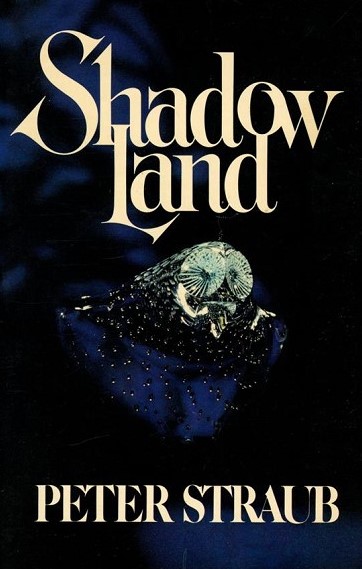 By PETER STRAUB (Coward, McCann & Geoghegan; 1980)
By PETER STRAUB (Coward, McCann & Geoghegan; 1980)
SHADOWLAND was an early novel by the late Peter Straub, and one of his first attempts at pushing the traditional horror story “as far as it could go.” The iconic GHOST STORY was Straub’s first such effort, and SHADOWLAND has much in common with that classic: multiple narrative strands, varying time periods, copious flashbacks and a judicious use of hallucinatory fantasy. As if all that weren’t enough, Straub also mixes in a healthy dose of the B-movie outrageousness that suffused his subsequent novel FLOATING DRAGON. Of the three novels I feel SHADOWLAND is by far the most resonant and exciting.
Of the three novels I feel SHADOWLAND is by far the most resonant and exciting.
The subject is fairy tales, as made clear by the vaguely haunting Charles Dickens quote that starts things off: “Little Red Riding Hood was my first love. I felt that if I could have married Little Red Riding Hood, I should have known perfect bliss.” The time period is the early 1960s and the protagonists are Tom and Dell, two 14-year-old friends. The setting is Shadowland, a secluded Vermont mansion owned by Dell’s uncle, a master magician named Coleman Collins.
In truth, however, SHADOWLAND’s narrative, setting and characters are far more varied and fluid than the above suggests. When we first meet Tom he’s a grown man performing card tricks, and the first person narrator a colleague who has little-to-no bearing on the narrative. Furthermore, the novel’s opening third is set at a school attended by the narrator, Tom and Dell, all freshmen, in the months before the latter two leave for Shadowland.
…SHADOWLAND’s powers are considerable, as are Straub’s robust prose and sure grasp of character. Most powerful of all is the eerie netherworld of dark sorcery and enchantment Straub creates, which incorporates time travel, telepathy, shape shifting and a secret gospel of Jesus Christ(!), and which is so vividly imagined and described it never fails to convince.
Said school is a hellhole run by a fascistic band of shitheads who make life miserable for all the kids in their care, the freshmen in particular. There’s also a horrific figure named “Skeleton” Ridpath, an upperclassman who lives up to his nickname in his fearsome appearance and all-consuming obsession with death. As related through two distinct voices—the aforementioned narrator’s and Tom’s—we learn how over the course of the school year the place becomes enveloped by some kind of dark spell, with horrific nightmares spreading through the student body and a mysterious dark-hued figure making periodic appearances. Both things seem to have a direct bearing on a catastrophic conflagration that ends the year on a deeply horrific note.
Tom and Dell’s train ride to Shadowland is also quite significant, involving a mysterious extra car joined at the end of their train that somehow crashes (we don’t learn the hows and whys until much later). As for Shadowland itself, the place is essentially an extension of the school, and many of the events that occur in Shadowland directly correlate with those that took place at the school. Skeleton even makes an appearance, or at least a creature that looks a lot like him (again, the hows and whys aren’t immediately made clear). So too do the Brothers Grimm, who reside in a closed-off room of Shadowland, and Rose Armstrong, a young hottie who participates in theatrical enactments put on by Coleman Collins (an element Straub admittedly lifted from THE MAGUS), and who inflames both boys’ budding libidos.
Mr. Collins proves a suitably forbidding personage whose tricks aren’t only of the magical sort. He claims to be looking for a successor to run Shadowland, and to be grooming Tom or Dell for that very position—but, as he proves early on, this guy has quite a few hidden, and extremely dangerous, depths.
The novel is not without flaws. Both Tom and Dell grow quite irritating as the multi-pronged narrative advances, with Del becoming increasingly whiney and jealous of Tom, whose romantic yearnings for Rose grow downright nauseating (especially since it’s clear from early on that Rose, like everything else in Shadowland, has much to hide). Yet SHADOWLAND’s powers are considerable, as are Straub’s robust prose and sure grasp of character. Most powerful of all is the eerie netherworld of dark sorcery and enchantment Straub creates, which incorporates time travel, telepathy, shape shifting and a secret gospel of Jesus Christ(!), and which is so vividly imagined and described it never fails to convince.
